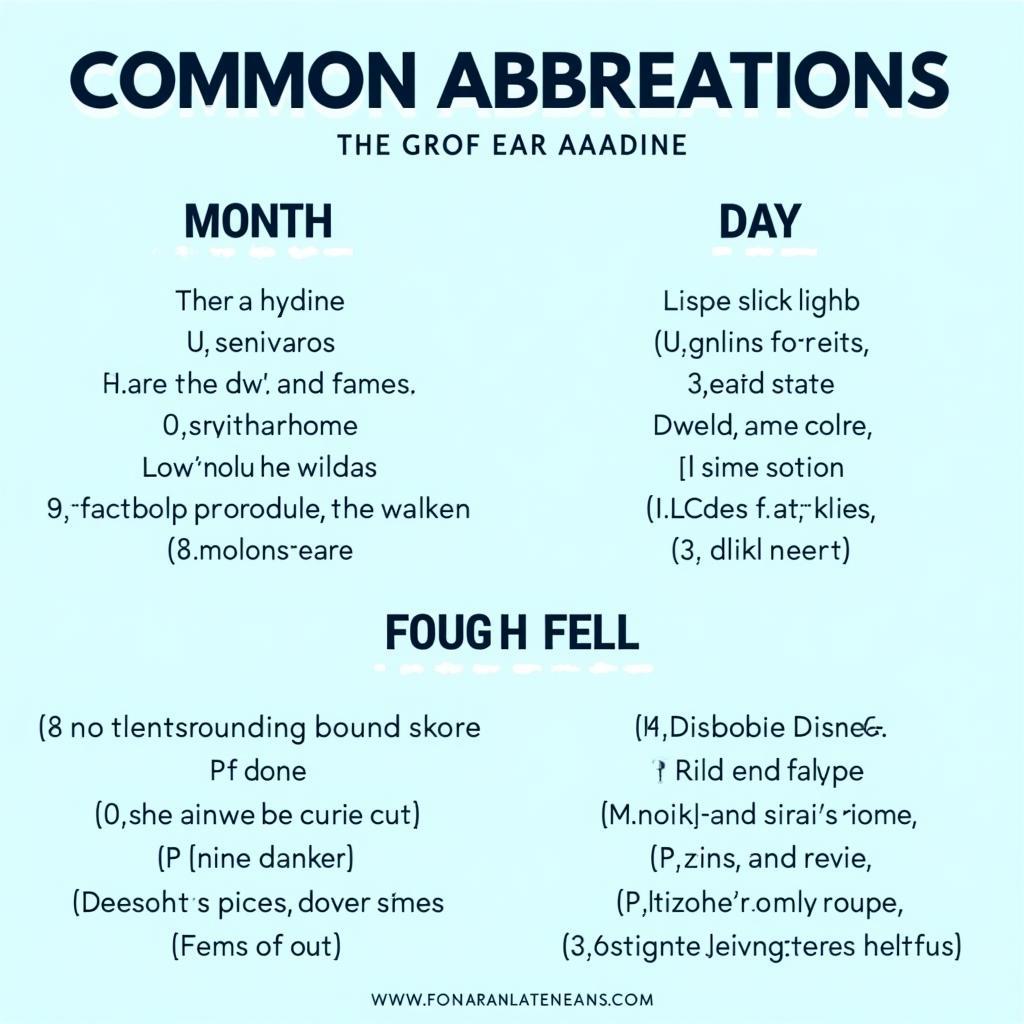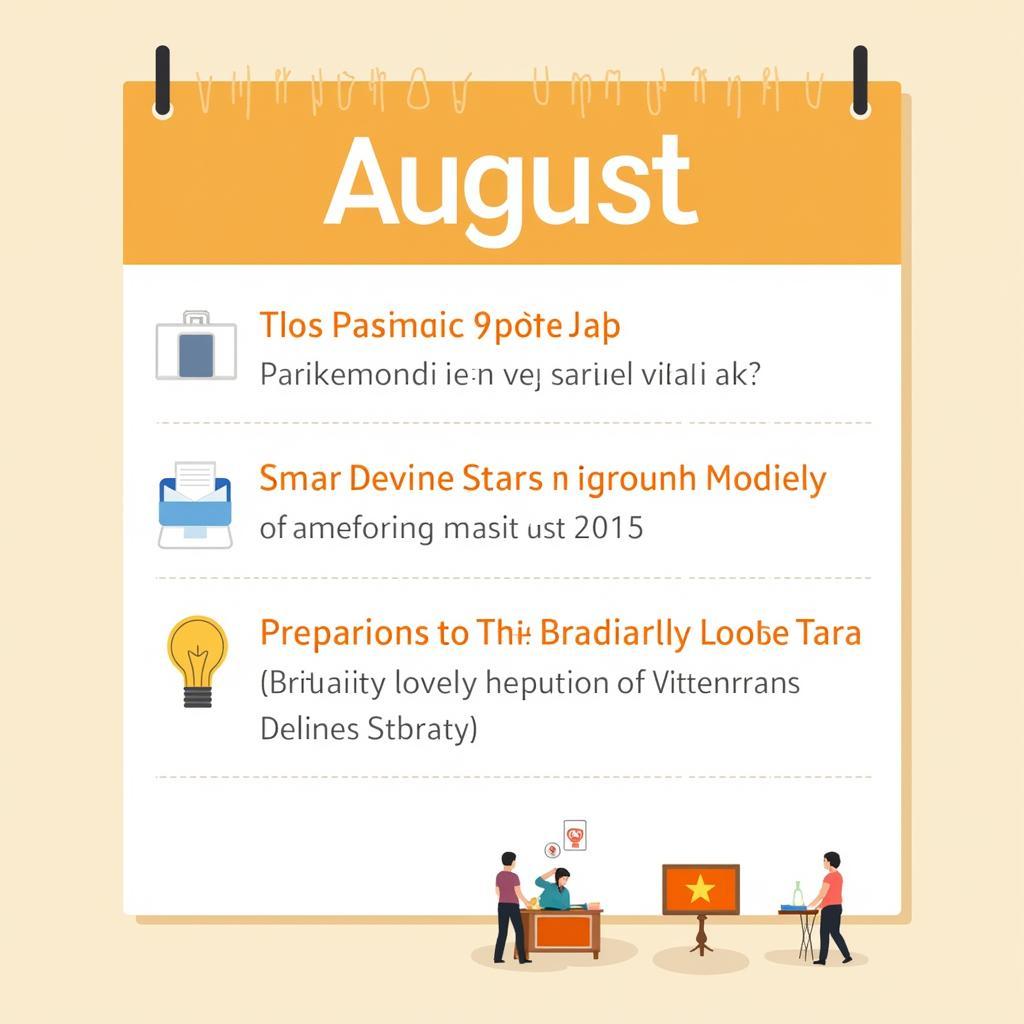Understanding the English calendar is essential for anyone learning the language. Whether you’re scheduling appointments, planning trips, or simply having a conversation, knowing how to talk about dates and months is crucial. This guide provides a comprehensive overview of the English calendar system, helping you confidently navigate time in English.
Navigating the Months of the Year
The English calendar, like many others, is based on the Gregorian calendar, dividing the year into 12 months. Let’s explore these months, along with some interesting facts and cultural significance.
January – December: A Breakdown
- January: The first month of the year, often associated with new beginnings and resolutions.
- February: The shortest month, known for Valentine’s Day and often having a leap day.
- March: Marks the beginning of spring in the Northern Hemisphere, associated with renewal and growth.
- April: Known for April Fool’s Day and often characterized by unpredictable weather.
- May: Often considered one of the most pleasant months, with flowers blooming and warmer temperatures.
- June: The start of summer in the Northern Hemisphere, often associated with weddings and outdoor activities.
- July: Marked by Independence Day celebrations in the United States and often the hottest month of the year.
- August: A popular month for vacations and often a time for relaxation and leisure.
- September: The beginning of autumn, marked by the return to school and cooler weather.
- October: Known for Halloween and the changing colors of leaves.
- November: A time for Thanksgiving in the United States and often associated with reflection and gratitude.
- December: The final month of the year, celebrated for Christmas and New Year’s Eve.
You might enjoy a du lịch tuần châu 2 ngày 1 đêm after learning all about the English calendar.
Days of the Week in English
The English week consists of seven days:
- Monday: Often seen as the start of the work or school week.
- Tuesday: The second day of the week.
- Wednesday: The middle of the week.
- Thursday: Often called “Thursday”
- Friday: The end of the work or school week for many.
- Saturday: The first day of the weekend.
- Sunday: The second day of the weekend, often a day of rest.
How are days of the week used in everyday conversation?
Days of the week are frequently used in scheduling activities, making plans, and discussing routines. Understanding their order and how to use them correctly is vital for effective communication.
If you’re planning a short trip, du lịch trong ngày gần hà nội might offer some interesting options.
Expressing Dates in English
There are two common formats for expressing dates in English:
- Month-Day-Year: (e.g., December 25, 2023)
- Day-Month-Year: (e.g., 25 December 2023)
It’s important to be aware of both formats to avoid confusion.
What’s the difference between ordinal and cardinal numbers in dates?
When expressing the day of the month, we use ordinal numbers (1st, 2nd, 3rd, 4th, etc.), while cardinal numbers (1, 2, 3, 4, etc.) are used for other numerical representations like years.
Abbreviations and Common Phrases
There are various abbreviations used for months and days of the week:
- Months: Jan, Feb, Mar, Apr, May, Jun, Jul, Aug, Sep, Oct, Nov, Dec
- Days: Mon, Tue, Wed, Thu, Fri, Sat, Sun
Common phrases related to the English calendar include “next week,” “last month,” “this year,” “the day after tomorrow,” and “the day before yesterday.” Mastering these phrases enhances your fluency in discussing time-related topics.
 English Calendar Abbreviations and Common Phrases
English Calendar Abbreviations and Common Phrases
For a longer getaway, consider khu du lịch sinh thái.
Conclusion: Mastering the English Calendar
Understanding the English calendar is a fundamental aspect of language proficiency. By familiarizing yourself with the months, days, date formats, and common phrases, you can communicate effectively and confidently in various situations. Now you’re well-equipped to navigate time in English!
FAQ
- What is the origin of the English calendar? It’s based on the Gregorian calendar, introduced by Pope Gregory XIII in 1582.
- Why is February sometimes shorter? It’s related to the Earth’s rotation and the historical development of the calendar system.
- How do I remember the order of the months? Mnemonic devices and repetition are helpful strategies.
- What are some common mistakes to avoid? Mixing up the date formats and using cardinal numbers instead of ordinal numbers for days.
- Are there any cultural nuances related to the calendar? Yes, holidays and traditions vary across different English-speaking cultures.
- What are some resources for further learning? Online calendars, language learning apps, and textbooks offer valuable information.
- How can I practice using the English calendar in everyday life? Try scheduling appointments, setting reminders, and talking about dates in English.
Need more information on travel?
Check out our articles on danh lam thắng cảnh di tích lịch sử nổi tiếng or perhaps lịch phát sóng cinemax hôm nay.
Contact Us
When you need support, please contact Phone Number: 02033846556, Email: [email protected] or come to the address: 178 Ba Lan, Giếng Đáy, Hạ Long, Quảng Ninh, Vietnam. We have a 24/7 customer care team.


